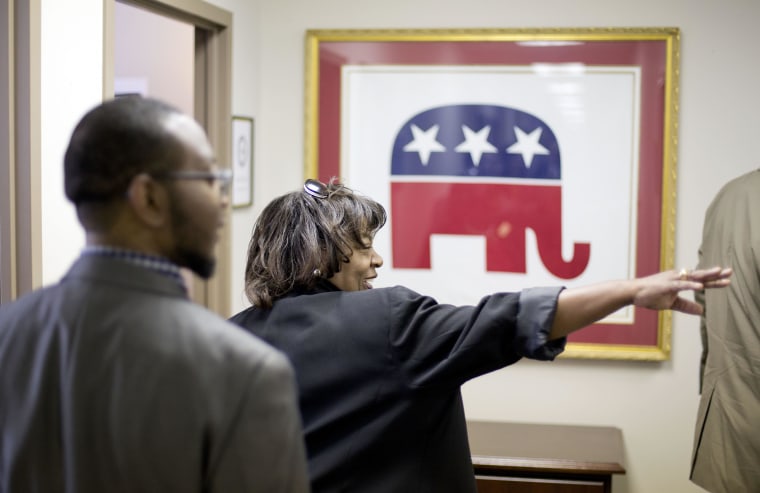CINCINNATI, OHIO - With President Barack Obama no longer on the ballot, Republicans are courting blacks anew, while Democrats need African-American voters more than ever.
In key Senate races in Georgia, North Carolina, and Louisiana this fall, Democratic candidates will struggle to gain the support of even a third of white voters, who are increasingly conservative in the South. But the party can win those races if they combine that fraction of the white vote with recent levels of Democratic support among African-Americans, who will likely make up more than 20 percent of voters in all three states.

The president won 93 percent of the black vote in 2012.
Republican see an opportunity to reduce that advantage, both this fall and particularly in the 2016 presidential election. By appearing at the National Urban League’s annual conference this week, Republican National Committee Chairman Reince Priebus and Kentucky Sen. Rand Paul sought to send the message that their party’s days of conceding the black vote are over.
“We want you to know that the Republican Party is listening to you and fighting for you,” Priebus said in his speech to the group.
Obama’s strong support among blacks is not unusual in one sense: Al Gore and John Kerry also won about 90 percent of the African-American vote during their presidential runs. But the intensity has been special: the U.S. Census Bureau estimated than in 2012, for the first time ever, black voters cast ballots at higher percentage than whites.
Voter turnout always drops in a midterm election compared to a presidential election, among all demographic groups. But this year, a coalition of Democratic groups, including the Democratic Senatorial Campaign Committee, are spending millions to target those liberal-leaning voters, including African-Americans, who voted in 2012 but might not in 2014 unless they are repeatedly contacted.
Matt Canter, deputy executive director of the DSCC, said party officials also see the opportunity to register people who did not vote in 2012, particularly in states like Arkansas where the Obama campaign did not invest heavily.
There will also be an attempt to register African-Americans who just moved to some of these states.
“When you talk about minorities going back to the South, Georgia is the epicenter," said Cornell Belcher, a Democratic pollster who advised Obama’s campaigns in 2008 and 2012.
The math is slightly different in each Southern state. (Obama won less than 20 percent of the white vote in Louisiana, but 32 percent of its residents are black, providing a path to victory for incumbent Democratic Sen. Mary Landrieu. In North Carolina, 22 percent of voters are black, but the state’s white voters are more liberal; Obama won about a third of them in both 2008 and 2012.)
"We want you to know that the Republican Party is listening to you and fighting for you."
But a successful Democratic candidate in the South will need nearly universal support and high turnout among African-Americans to win.
As the New York Times wrote this week, "If Democrats win this November, black voters will probably represent a larger share of the winning party’s supporters in important states than at any time since Reconstruction."
Democratic strategists say black voters in particular are angered by controversial voting laws passed by GOP-led governors and legislatures and by the tone used by some Republicans to describe the president.
So in their speeches here, Vice President Joe Biden condemned what he called an “assault’ on voting rights, while Democratic National Committee Chair Debbie Wasserman Schultz raised the specter of Obama facing impeachment if Republicans make gains this fall.
“Those are hugely motivating issues,” Canter said.
Republicans, meanwhile, are engaged in a more long-term project. Priebus has set up GOP black outreach offices in cities like Detroit and had numerous meetings with black figures like Marc Morial, the Urban League’s president.
The Republican chairman has two aims: to get the GOP into the double digits among African-Americans in 2016 and to rebrand the party to voters of all colors as one that is diverse and inclusive.
Paul, looking to bolster his party’s image and to prepare for his own potential 2016 presidential run, has joined with Priebus at times in black outreach. But he has gone even further than the party chairman, becoming a vocal advocate for reducing mandatory minimum prison sentences and directly criticizing the party for ignoring black voters in the past.